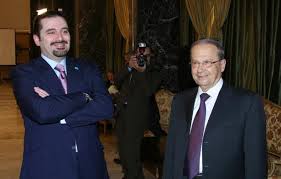
The essence of the disagreement goes beyond Jumblatt and cuts directly to Aoun’s relationship with the Lebanese political establishment. The future of Lebanon’s struggling economy, rests not so much on PM Hariri’s ability to form a cabinet as on Aoun’s acceptance of the limits of the presidency as stipulated in the Taif Accord.
By Makram Rabah
Politics is the art of the possible, a Bismarckian aphorism that seems to have passed Lebanon’s political elite by. After five months of trying, Lebanon’s parliament has failed to agree on a cabinet, suggesting that even the politics of the highly possible is a stretch too far.
Lebanese Prime Minister-designate Saad Hariri, who has borne primary responsibility for this herculean task, has faced many challenges, including Lebanese President Michael Aoun’s staunch refusal to cooperate on the matter.
Aoun is ready to do whatever it takes and at any cost — including hamstringing Hariri’s attempts to form a government — to establish himself as the embodiment of a strong Christian leader. Opposing him, among others, is Walid Jumblatt, the Druze leader of the Progressive Socialist Party (PSP), who refuses to rubber stamp any action he sees as undermining the 1989 Taif Agreement, the template for Lebanese governance since the end of the civil war.
The Taif Agreement states the president of Lebanon shares power with the prime minister and the cabinet, limits that Aoun appears reluctant to accept.
As Hariri has sought to establish a cabinet, while retaining the veto over policy that controlling one-third of its seats affords him, he has found himself in direct opposition to the president’s will.
Any concerns Hariri may harbour about negotiating with Aoun are unlikely to be without foundation. Aoun, an ally of both Hezbollah and the Assad regime in Damascus, has a record of offering assurances but then breaking them.
In this case, those broken promises could lead to the Lebanese state normalising relations with the Assad regime, which is accused of killing Hariri’s father, former Prime Minister Rafik Hariri.
Among the disputes hampering any agreement is the feud between Gebran Bassil, Aoun’s son-in-law and leader of his Free Patriotic Movement party, and the PSP.
Aoun’s relationship with Jumblatt has always been stormy. Much of the bad blood stems from Aoun’s perception of Jumblatt as one of the pillars of the Taif Agreement. Also, Jumblatt is a painful personal reminder of Aoun’s defeat in 1990 when — with Syrian military support — he was ejected from the presidential palace and his renegade movement terminated.
Jumblatt has viewed Aoun as a petty military officer incapable of respecting Lebanon’s traditional political factions and unable to admit that the country has transitioned to a new constitution from the one that first saw Aoun’s rise to prominence.
Despite their seemingly irreconcilable differences, Jumblatt agreed to back Aoun in his presidential bid of 2016, declaring that he was “voting for the Reconciliation of the Mountain,” which ended the bloody conflict between the Druze and Maronites that had waged over two decades.
Aoun pledged that his presidency would embody the national consensus, a promise that collapsed with Aoun soon bullying both allies and opponents as he sought his own ends.
The confrontation between the two escalated after an administrative order from Minister of Education Marwan Hamadeh, who belongs to Jumblatt’s bloc, instructed one of the ministry’s pro-Aoun employees to be replaced with another more qualified and deserving of the post.
Bassil retaliated and ordered both the ministers of Energy and Environment to take punitive actions against two senior Druze civil servants, ostensibly for no other reason than they were members of the PSP.
Jumblatt, posting on Twitter, accused Aoun and his entourage of eroding the state, undermining the Taif Agreement and abusing the power of the presidency. Aoun and Jumblatt later agreed to de-escalate tensions and both sides issued directives that their followers should refrain from openly attacking the other.
However, the confrontation is far from over. The essence of the disagreement goes beyond Jumblatt and cuts directly to Aoun’s relationship with the Lebanese political establishment, which appears vexed and alarmed by Aoun’s political rampaging.
Consequently, the future of the next government, as well as the future of Lebanon’s struggling economy, rests not so much on Hariri’s ability to form a cabinet as on Aoun’s acceptance of the limits of the presidency. In politics, what is wished for and what occurs are often two entirely different things.
THE ARAB WEEKLY

Leave a Reply
You must be logged in to post a comment.